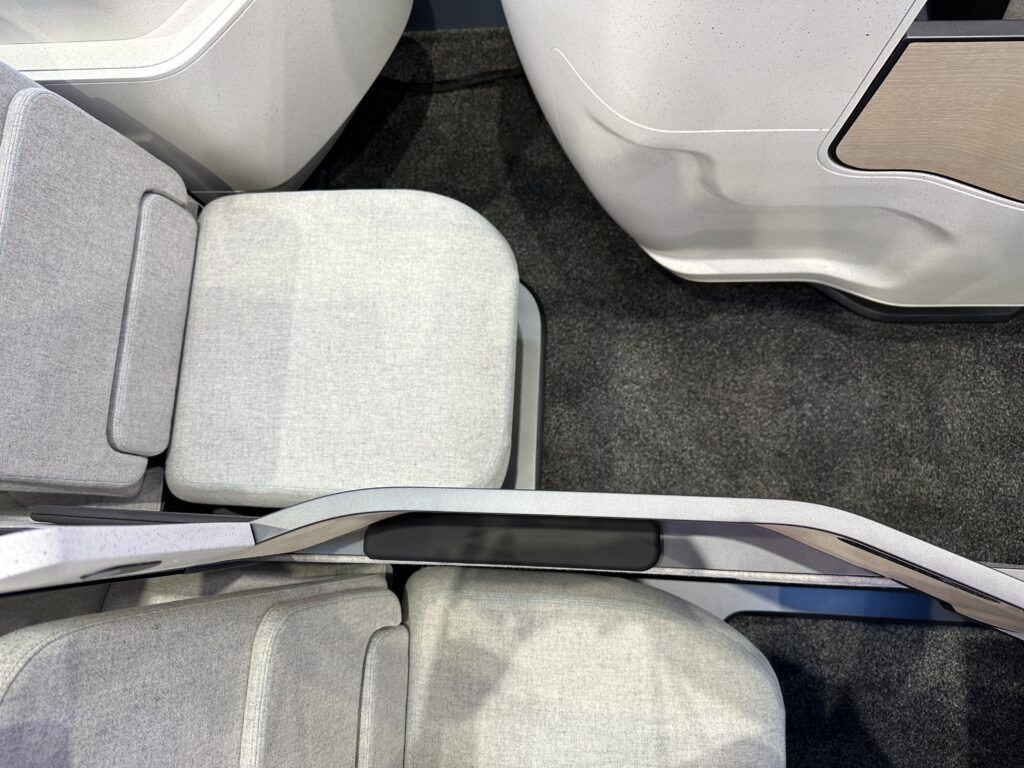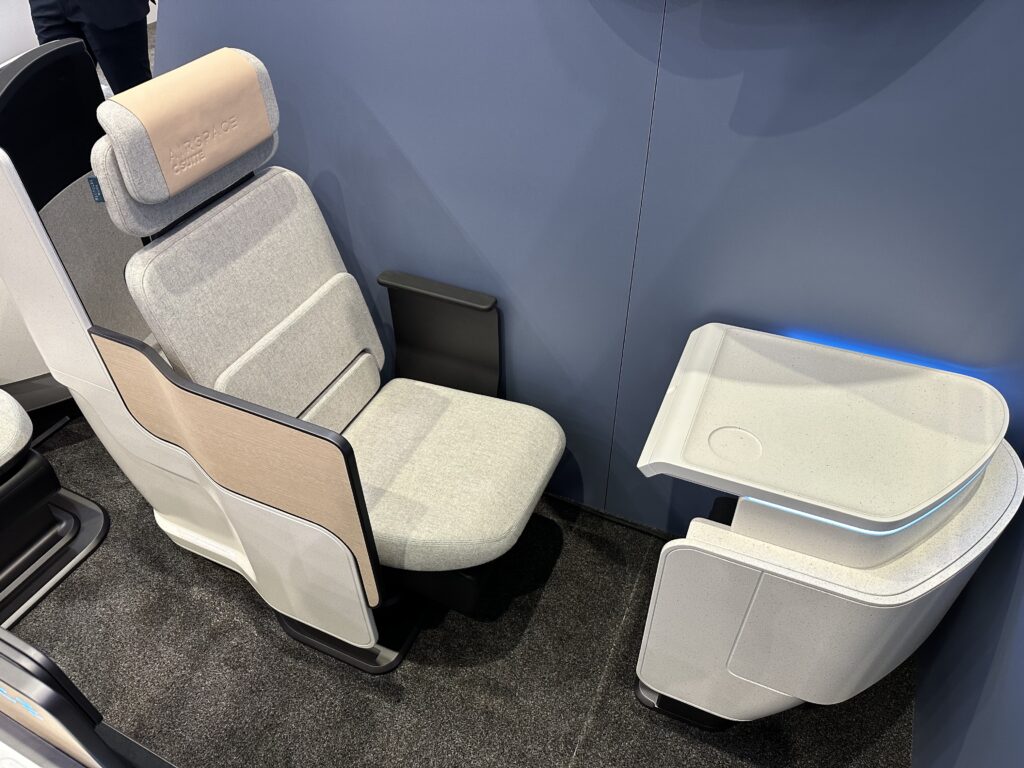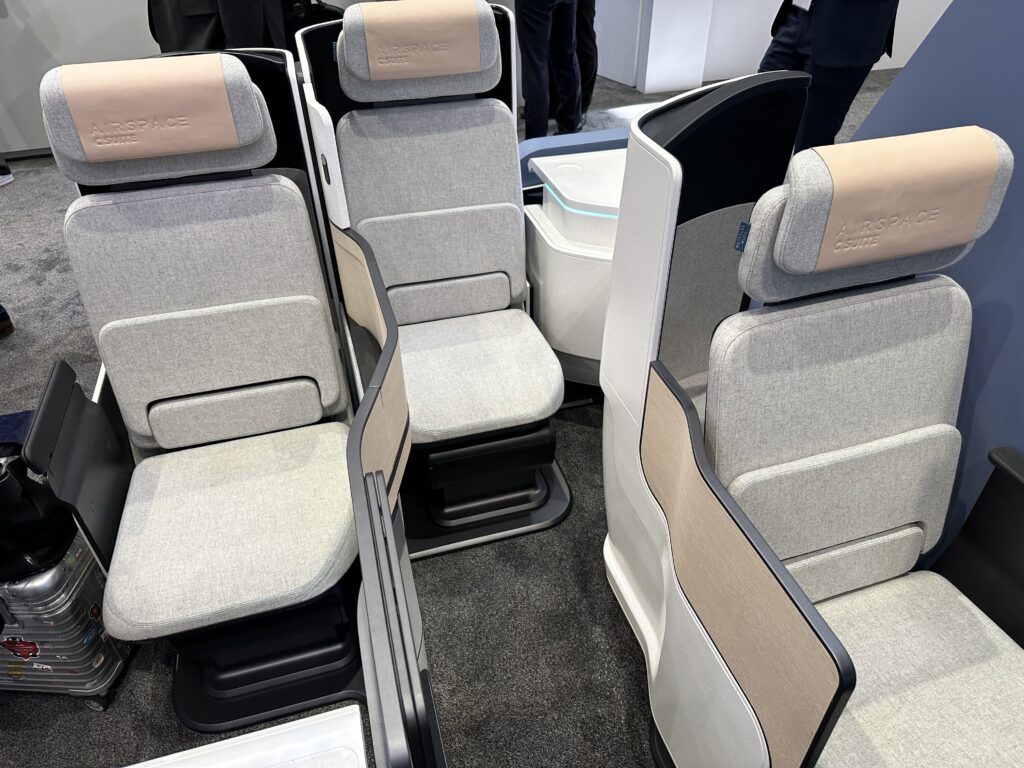 One of the most compelling seats on show at the Aircraft Interiors Expo wasn’t at a seatmaker’s stand or even within an aircraft cabin mockup. The name is C Suite, it’s a joint collaboration between Airbus and its premium seatmaker subsidiary Stelia, and it’s a new category of seat: ultra-compact staggered seats with direct aisle access via a shared gangway, focussed on the single-aisle market.
One of the most compelling seats on show at the Aircraft Interiors Expo wasn’t at a seatmaker’s stand or even within an aircraft cabin mockup. The name is C Suite, it’s a joint collaboration between Airbus and its premium seatmaker subsidiary Stelia, and it’s a new category of seat: ultra-compact staggered seats with direct aisle access via a shared gangway, focussed on the single-aisle market.
C Suite is not yet a product, with Airbus careful to refer to it as a concept and a study, but speaking with vice president of cabin marketing Ingo Wuggetzer, it is clear that this is one of Airbus’ much-needed seating options for long-range single-aisle aircraft in the A320neo family, particularly the A321LR and XLR versions.
Wuggetzer termed C Suite one of Airbus’ “real solutions — real concept ideas. Of course, that is in development, the seat concept, but it should inspire and guide the industry towards the right structural systematic approach. You also have things that are almost ready to go: they could be introduced now or one or two years from now.”
Within the Airbus stand at the Aircraft Interiors Expo, C Suite was primarily billed more as a concept for circular design and the use of recycled materials than as a cabin concept.
But as an ultra-dense business class seat, its design is very persuasive indeed.
The product itself tessellates within the cabin via a three-seat stagger, with seats we’ll call “window”, “middle and “aisle”, although the “middle” seat is close to the window over a console that is the “aisle” seat’s footrest, and all offer direct aisle access without climbing over a neighbour.
The efficiency comes from the window and middle seats sharing much of the gangway to the aisle ahead of the aisle passenger’s foot console, and from there being no enclosed footwell space for the middle seat passenger, with the equivalent of an ottoman folding down from the wall shared with the aisle seat and needing to be raised before gaining access to the aisle.

The shared gangway between the middle and window seat is one of the ways C Suite achieves its density. Image: John Walton
This mechanism is rather reminiscent of the way that the British Airways Club World seats of 2000 and 2006 have a fold-down ottoman that makes part of the bed, except turned 90 degrees. The immediate question that arises about emergency egress certification, as a result, should be relatively solvable.
Width is clearly an open question here, with the armrest of the window seat scalloped up in a way that seems to echo the shape of the cabin wall. Is this indeed needed? Might a judiciously shaped throw cushion do the job?

The window seat’s armrest seems odd, and raises the question of whether it’s necessary. Image: John Walton
Indeed, there is much development possibility with this seat, and there are many questions to ask. What, for example, is the optimum three-dimensional curve pattern for the interface between the aisle and middle seats at shoulder level?

Questions include just how much 3D scalloping of seat sidewalls can be done, and how. Image: John Walton
Would it also make some sense to consider whether the aisle seat, and perhaps even the window seat, would tessellate better as rear-facing seats?
What are the zero-sum game implications of these seats, where the window seat seems the most spacious, the middle seat the most private (and indeed most suitable for taller passengers), while the aisle seat in many ways feels the poorest sibling of the lot in terms of privacy and features?
Is there a better use of the space between each of the window seat rows, to the side of the aisle seat, than just leaving it open as, one presumes, hand luggage storage space for the middle seat?
In the age of transparent and translucent thermoplastics within the cabin, and with composite structures, how much of the relatively thick recycled thermoplastic can be shaved down or even replaced with a semi-see-through option to boost the perception of space?
What are the implications for wheelchair users: are they relegated to only the aisle seat, and regardless, how does C Suite meet US regulatory guidelines that fifty percent of seats must offer wheelchair access?
All in all, C Suite is a product to keep an eye on as it answers these questions, moving from concept or study to real-world product.
Related Articles:
- How Diehl and HAECO have reimagined the single-aisle premium cabin
- Stelia reveals Opera herringbone for Air France A350, linefit 787s
- A spiky 2023 for business class supply chain, production and demand
- Delta Flight Products partners to take Air4All through development
- What does a five-star business class seat look like in 2023?
Featured image credited to John Walton













